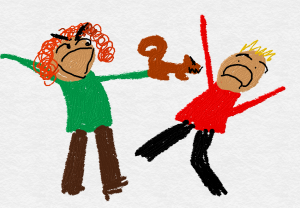Dear Language Nerd,
What’s the difference between “begging the question” and “raising the question”? I was with a colleague yesterday and he was going on about how furious he was that people use the two interchangeably. I didn’t know why it mattered so I just nodded and grimaced at appropriate times. Please help, I am around him all the time and now if I use the wrong one I will clearly deserve a fiery death.
Thanks,
K.P.R.
***
Dear Kipper,
“Raising the question” is easy – it means that something makes you think of a question. For example, the headline “Woman stabs husband with squirrel” immediately raises several questions for me. Was the man simply holding the squirrel? Or was it the woman’s murder weapon? If the latter, how? Did she train it? How long would that take? Is it cost-effective?
“Begging the question” is often used nowadays to mean exactly the same thing. But it didn’t always, and as tends to happen when language changes, many of those aware of its previous meaning are heartily annoyed by the modification and prepared to fight it tooth and nail and tiny squirrel claw.
This time I’m more sympathetic than usual to the Language Lockdown types, because the original meaning of “beg the question” is quite interesting: it’s the name of a logical fallacy. Logical fallacies are varieties of bad reasoning, ways of moving arguments away from the careful weighing of the merits and flaws of two viewpoints and towards hollering, hootenanny, and general chaos. With the straw man fallacy, for example, a person exaggerates or misrepresents another person’s position (“linguists think that language should have NO RULES AT ALL!”) and then attacks that misrepresentation as outrageous (“they’re destroying society as we know it!”). Or there’s the bandwagon fallacy, which holds that popularity = accuracy (the problem with this one can be summed up in the single word “cigarettes”).
But those are beginner-level fallacies. “Begging the question” is much more subtle and clever. It boils down to stating that something is true because it is true, but without letting on that that’s all you’re saying. Whatever you’re trying to prove is slipped in as part of your opening statement. In its unevolved form, it’s “X is true because Y,” where Y, instead of being an actual reason, is simply a restatement of X. “I don’t like squirrels because they suck” doesn’t give us a reason; it’s saying “I don’t like squirrels because I don’t like them.”
The less obvious it is that X and Y are the same thing, the more likely the speaker is to get this reasoning past the listener unremarked. Often X is stated in plain, short words and Y in more elaborate terms: “Squirrels are pests because they are nuisances and detrimental vermin.” And as the distance between X and Y gets longer, it takes more attention to catch the fallacy: “You should not trust squirrels, because, as a number of the most sincere and dedicated squirrelologists have corroborated, they are duplicitous.”
So that’s the particular meaning of “begging the question.” I have never myself seen a problem with distinguishing this philosophical use from the everyday same-as-raise-the-question one, even when both are used one after the other, as occasionally occurs among the classy people that frequent my rhetorical salons. But if you’d like to feel safer, just use “raise the question” most of the time and “beg the question” only for the logical fallacy, and your coworker will have no cause to let slip the rodents of war.
Alternatively, you could try fighting snot with snot. (…Ew.) Next time it comes up, assume your haughtiest manner and say, “Mmm, trying to fight the ever-flowing evolution of language is so nudiustertian. All the best people, when they want to indicate the formal logical fallacy, simply refer to it in the Latin: petitio principii.”
If that irritates him, though, watch out. Those little claws are sharp.
Yours,
The Language Nerd
Got a language question? Ask the Language Nerd! asktheleagueofnerds@gmail.com
Twitter @AskTheLeague / facebook.com/asktheleagueofnerds
For a spirited defense of spiritedly defending “beg the question” solely as the fallacy, please see begthequestion.info. And to train your own defenses against this rhetorical side-step, try catching some out in the wild, where they can be well camouflaged.
